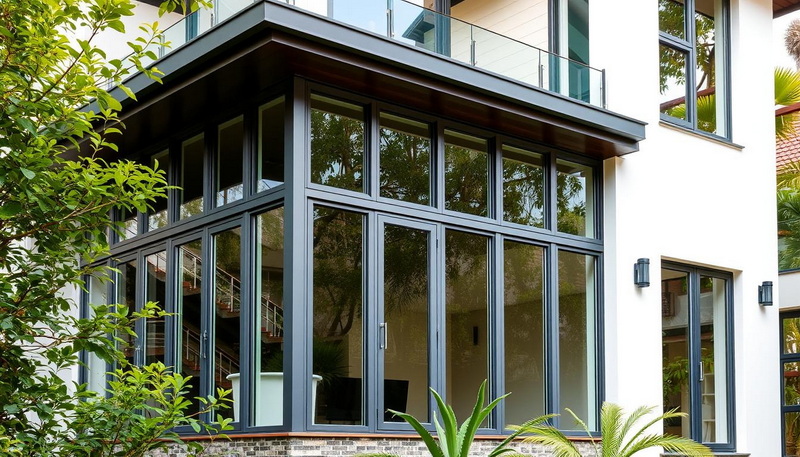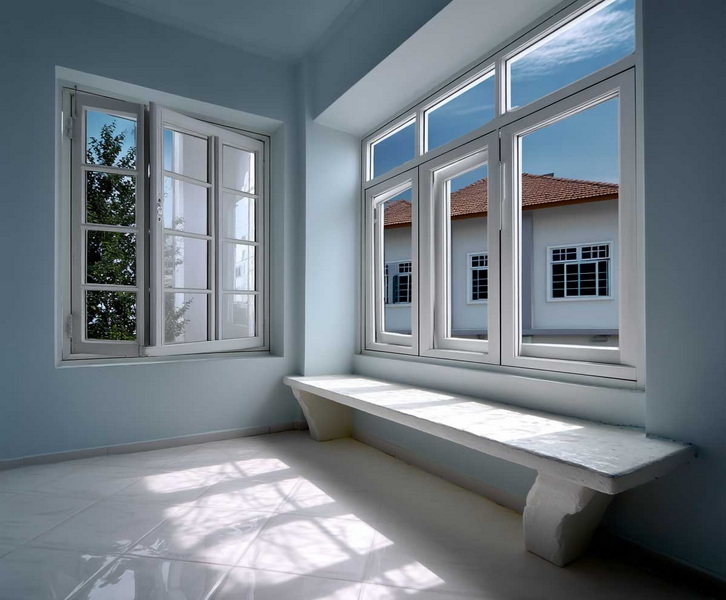English


Views: 222 Author: Tomorrow Publish Time: 2025-07-14 Origin: Site











Content Menu
● The Importance of Aluminum in Window Manufacturing
● Raw Material Processing and Frame Extrusion
● Advanced Manufacturing Techniques
● Rigorous Quality Control and Testing
● Environmental Considerations and Sustainability
● Innovations in Aluminum Window Technology
● Professional Installation: The Final Step to Longevity
● Maintenance and Care for Aluminum Windows
● Frequently Asked Questions (FAQ)
>> 1. What makes aluminum windows more durable than other window types?
>> 2. How do aluminum windows makers test for quality?
>> 3. Why is the extrusion process important in aluminum window manufacturing?
>> 4. How does professional installation impact the lifespan of aluminum windows?
>> 5. Can aluminum windows be customized in terms of appearance?
Aluminum windows have become a preferred choice in modern architecture due to their strength, sleek design, and longevity. The makers of aluminum windows employ a meticulous process to ensure that each product meets the highest standards of quality and durability. This article explores how aluminum windows makers achieve this through raw material selection, advanced manufacturing techniques, rigorous quality control, and professional installation.

Aluminum is a unique material that combines lightweight properties with exceptional strength and resistance to corrosion. These characteristics make it ideal for window frames, especially in environments exposed to harsh weather conditions such as heavy rain, strong winds, salt air near coastal areas, and extreme temperature fluctuations. Aluminum windows often have a lifespan exceeding 40 to 50 years when properly maintained, which surpasses many other window materials.
The natural resistance of aluminum to rust and corrosion means that it does not warp, crack, or swell like wood or degrade like some plastics. Additionally, aluminum frames can be anodized or powder-coated to provide a durable finish that resists fading, scratching, and discoloration, further enhancing their longevity and aesthetic appeal.
The journey of aluminum windows begins with the selection of high-quality raw aluminum, derived from bauxite ore. This raw material undergoes refining and purification before being shaped into window frame profiles through extrusion. Extrusion is a critical process where heated aluminum billets are forced through a die to create precise, custom cross-sectional shapes tailored to window design requirements.
This process allows aluminum windows makers to produce frames that are both strong and lightweight, enabling easier handling and installation without compromising structural integrity. The versatility of extrusion also permits the creation of complex frame designs that meet architectural and functional demands.
After extrusion, aluminum profiles undergo several manufacturing steps to transform them into finished window frames. These include cutting, machining, and assembling with high precision. Aluminum windows makers often incorporate thermal breaks—insulating barriers within the frame—to reduce heat transfer and improve energy efficiency.
The frames are then treated with surface finishing processes such as anodizing or powder coating. These treatments enhance corrosion resistance and provide a wide range of color and texture options, allowing customization to suit different building styles.
Glass installation is another crucial stage. Makers use high-quality glass panels, often double or triple-glazed, to improve insulation, soundproofing, and security. The glass is carefully fitted and sealed to the frame to prevent air and water infiltration.
Quality assurance is paramount for aluminum windows makers. Throughout the production cycle, multiple inspections and tests are conducted to ensure durability and performance:
- Visual Inspection: Frames and glass are checked for defects such as scratches, dents, uneven paint, or misalignments.
- Dimensional Accuracy: Precise measurements guarantee that each window fits perfectly within specified tolerances.
- Joint and Seal Integrity: Frame joints and seals are examined to ensure tightness and prevent water leakage.
- Functionality Tests: Windows undergo repeated opening and closing cycles to verify smooth operation and mechanical reliability.
- Weather Resistance: Simulated tests expose windows to wind pressure, rain, and temperature extremes to confirm their ability to withstand harsh conditions.
These stringent tests help aluminum windows makers deliver products that maintain their structural integrity and appearance over decades.

In today's environmentally conscious world, aluminum windows makers are also focusing on sustainability. Aluminum is a highly recyclable material, and many manufacturers use recycled aluminum in their production processes without compromising quality. This reduces energy consumption and environmental impact compared to producing new aluminum from raw ore.
Moreover, the energy efficiency achieved by aluminum windows with thermal breaks and insulated glazing contributes to reducing heating and cooling costs in buildings. By minimizing energy loss, these windows help lower carbon footprints and support green building certifications.
Aluminum windows makers often comply with environmental regulations and standards, ensuring that their production methods and products align with sustainable development goals.
The aluminum windows industry continuously evolves with technological advancements. Makers are integrating smart features such as automated opening systems, integrated blinds between glass panes, and enhanced security mechanisms. These innovations improve user convenience, safety, and energy management.
Additionally, improvements in powder coating technologies have led to more durable and environmentally friendly finishes. These coatings resist chipping and fading better than traditional paints, maintaining the window's appearance for longer periods.
The incorporation of advanced sealing materials and weatherstripping also enhances the airtightness of aluminum windows, reducing drafts and improving indoor comfort.
Even the highest quality aluminum windows require expert installation to achieve their full potential. Proper installation ensures airtight sealing, prevents thermal bridging, and maintains the structural stability of the window.
Professionals prepare the window openings carefully, align the frames precisely, and use appropriate fasteners and sealants. They also install internal and external sills and trim to protect against moisture ingress and enhance aesthetics. Post-installation, each window is checked for smooth operation and proper locking mechanisms.
Correct installation not only extends the life of aluminum windows but also maximizes energy efficiency and occupant comfort.
To ensure aluminum windows maintain their quality and durability over time, regular maintenance is essential. Aluminum windows makers recommend periodic cleaning with mild detergents to remove dirt and pollutants that can accumulate on the surface. Avoiding abrasive cleaners helps preserve the protective coatings.
Inspecting seals and weatherstripping annually helps identify any wear or damage that could compromise insulation and waterproofing. Prompt repairs prevent further deterioration.
Lubricating hinges and locking mechanisms ensures smooth operation and prevents mechanical failures. With simple maintenance routines, aluminum windows can retain their functionality and appearance for many years.
Aluminum windows makers ensure quality and durability through a comprehensive process that starts with selecting superior raw materials and continues through advanced extrusion, precise manufacturing, thorough quality control, and professional installation. The result is a window product that offers exceptional strength, resistance to weather and corrosion, energy efficiency, and aesthetic versatility. Innovations in technology and a focus on sustainability further enhance the appeal of aluminum windows. With proper care and maintenance, aluminum windows can last for decades, making them a sustainable and cost-effective choice for residential and commercial buildings.

Aluminum windows are highly resistant to corrosion, warping, and cracking due to the metal's natural properties and protective surface treatments. This durability allows them to withstand extreme weather and environmental conditions better than wood or vinyl windows.
They perform visual inspections, dimensional checks, joint and seal integrity tests, operational cycling, and weather resistance simulations to ensure the windows meet strict standards for durability and functionality.
Extrusion shapes the aluminum into precise frame profiles that combine strength with lightweight properties, enabling custom designs that fit architectural needs while maintaining structural integrity.
Proper installation ensures airtight sealing, prevents water and air infiltration, and maintains frame alignment, all of which are critical for maximizing durability, energy efficiency, and smooth operation.
Yes, aluminum windows makers offer a variety of finishes such as anodizing and powder coating in many colors and textures, allowing customization to match different architectural styles and personal preferences.
Stainless Steel Grades 201 Vs 304: Cost Vs Performance Breakdown
316L Vs 316 Stainless Steel Grades: Which Is Better for Corrosion Resistance?
Comparing Austenitic Vs Martensitic Stainless Steel Grades: What You Need To Know?
Stainless Steel 430 Vs 304: Key Differences Explained for Manufacturers
304 Vs 316 Stainless Steel Grades: Which One Suits Your Project Best?
Stainless Steel Pipes Vs Galvanized Pipes: Durability And Cost Analysis
Comparing Stainless Steel Pipes And PVC Pipes: What You Need To Know?
Stainless Steel Pipes Vs Copper Pipes: Pros And Cons for Industrial Use
Seamless Stainless Steel Pipes Vs Welded Pipes: Key Differences Explained
Stainless Steel Pipes Vs Carbon Steel Pipes: Which One Suits Your Project?
